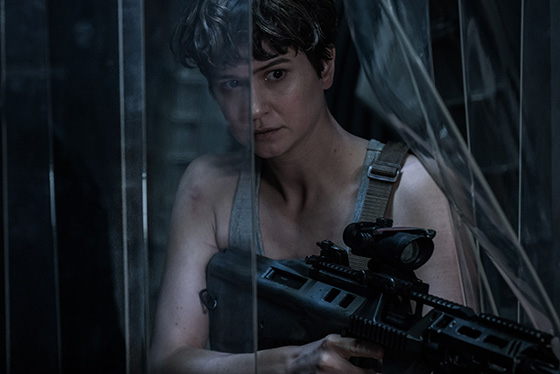Alien: Covenant

Photo Credit: Mark Rogers. TM & © 2016 Twentieth Century Fox Film Corporation. All Rights Reserved.

Fifteen years after archaeologist Elizabeth Shaw (Noomi Rapace) encountered a parasitic species while attempting to chase down the alien origins of humanity, a colonization mission to Origae-6 goes awry when a radiation burst cripples the ship.
Like the previous expedition, funded by the eccentric Peter Weyland (Guy Pearce), the human crew is accompanied by an android, Walter (Michael Fassbender). Unlike his predecessor, David (so named for Weyland’s fondness for wearisome metaphor vis-a-vis Michelangelo), Walter’s intelligence is curbed. This seems peculiar, as it was Weyland’s intent to crew an android as a sort of HAL-9000 with an ulterior motive.
ALIEN: COVENANT is the second part of Ridley Scott’s prequel series to the 1979 horror film starring Sigourney Weaver as the protagonist, Ripley. While science fiction cinema has had elements of horror in its mid-century roots, ALIEN emphasized claustrophobia and terror as the primary elements, pushing the science fiction to the backdrop. Ridley Scott, however, hasn’t seemed to successfully move away from the tropes he helped popularize–namely, the Final Girl. Instead, he works backwards from them stuck in a kind of causal loop of intense mediocrity.
The surviving members of the crew are systematically picked off by the “neomorph”—like “xenomorph” but, you know, new… except this is a sequel, so shouldn’t they be protomorphs? Never mind. Scott’s modern Ripley, Daniels (Katherine Waterston), a terraforming engineer aboard the Covenant, happens upon another android who leads them (unsurprisingly) to a trap.
THE SPOILER: Yes, the villain is David… In spite of escaping a completely unrelated star system, in all the vast universe, somehow the cosmic radiation accident led the Covenant to the exact place where David and Elizabeth landed. And yes, David is going to double-cross them. And yes, he uses a trick that would make Hayley Mills proud (or nauseated). To his credit, Fassbender invokes the same creepy ethical vacancy of Ash in the original ALIEN. And maybe there’s something to reintroducing that 1970’s-era distrust of technology into cinema at a time when our own fears about the surveillance state are coming to fruition. In a back room, H.R. Giger’s early concept designs strewn across a table, we discover that David is a eugenics hobbyist, synthesizing and curating the “perfect” being in an attempt to recast himself from servant of one species to god of another.
Sidenote: Fassbender also supplies a hint of homoeroticism or, perhaps, auto-eroticism… but it’s merely titillation, eclipsing that hint of Sgt. Lope’s (Demián Bichir) marriage to Sgt. Hallett (Nathaniel Dean).
A prequel could conceivably take any number of routes to get you to where you’ve been, but Scott seems to be repeating the same storyline again and again only peppering us with bits of mythology like the interesting clues that lead nowhere in the television series, LOST. In the end, they’re all dead anyway.